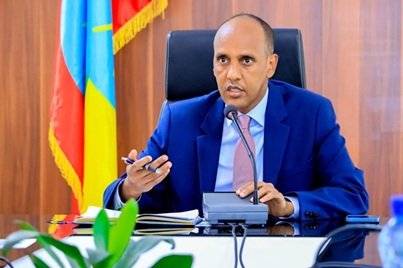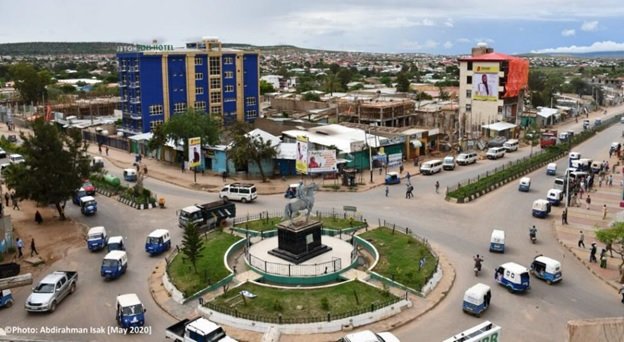By Abdikarim Haji Abdi Buh
In the often-tumultuous landscape of Ethiopia, the Somali Regional State under President Mustafe Muhumed Omer (Cagjar) stands as a rare and instructive exception. Since taking office, Mustafe Cagjar has championed a governance model that places the voices of the people at its core. Public consultation is no longer a box-ticking exercise—it has become a governing philosophy that underpins every major policy and infrastructure initiative.
From the outset, the president’s administration made it clear that no project affecting the livelihoods of the people would proceed without their input. This approach has fostered a remarkable sense of ownership among residents, who no longer view development as something imposed from above, but as a shared endeavor. In a context where mistrust of authorities often undermines reform, the Somali Regional State has built trust by ensuring that people are not only heard—but heeded. In fact, some community suggestions that diverged significantly from original government proposals were incorporated without resistance—only appreciation. The result: high rates of project success, public satisfaction, and social cohesion.
Take Jigjiga, the capital of the Somali Region, now undergoing a transformation that borders on the extraordinary. Today, it is not only the most secure and peaceful city in Ethiopia, but also one of the most dynamic urban centers in the Horn of Africa. Roads are being widened to three lanes, green medians are being added, and urban planning is unfolding with a level of sophistication rarely seen elsewhere in the country. But this transformation has come at a cost—over 350 buildings, including mosques, businesses, and government offices, were demolished to make way for road expansion.
Remarkably, despite the displacement and lack of compensation due to budget limitations, there has been no public complaint. Why? Because these plans were discussed, debated, and co-designed with the public long before the first brick was laid. Since the people’s voices were part of the blueprint, they view the inconvenience as a necessary sacrifice for a greater collective gain. The discomfort was shared—but so was the vision. And that has made all the difference.

Nowhere is this collaborative spirit more evident than in the handling of the iconic monument of Sayid Mohamed Abdulle Hassan, a national Somali hero. The statue currently sits at a busy roundabout where four roads intersect. To ease congestion and enhance public access, the monument is being relocated to a newly developed 4,000-square-meter green zone adjacent to the Sayid Mohamed Abdulle Conference Hall. The new location will not only better accommodate visitors but will also host a museum dedicated to his legacy, along with restaurants and recreational areas for families and tourists alike.
What sets President Mustafe Cagjar apart is that these sweeping changes didn’t provoke backlash—because they weren’t imposed. They were shaped through genuine collaboration with the community. The people were not merely informed; they were involved from the start. That is the hallmark of his leadership. Beyond infrastructure and civic pride, Jigjiga today is setting a new national benchmark for security and public trust. It is, by all credible accounts, the safest city in Ethiopia. Federal events are held in Jigjiga with ease and regularity. But perhaps more telling is the sight of Prime Minister Abiy Ahmed and First Lady Zinash Tayachew walking freely through the streets—unencumbered by heavy security, engaging directly with citizens from all walks of life.
Meanwhile, more than 30 heavy truck drivers have been abducted in Ethiopia’s Amhara region over the past two weeks—raising alarm among industry leaders and highlighting the deepening insecurity in the war-torn region. Solomon Zewdu, Executive Manager of the Ethiopian Heavy Vehicle Drivers Association, said in an interview last week with Addis Standard: “Where there is a government security presence—such as in Afar, Somali, and parts of Oromia—driver safety is far more stable. But in Amhara, the absence of accountability for armed groups has emboldened criminal networks.”
This level of public confidence is almost unheard of in today’s Ethiopia. In regions plagued by insurgency or intercommunal violence, even minor government initiatives are often met with skepticism, if not outright resistance. Yet in Jigjiga, there is a palpable sense of collective progress. Residents feel empowered and connected to the political process—and this civic inclusion has translated into a deeply rooted sense of safety. When people are part of the solution, they also become guardians of the peace.
Indeed, many now refer to Jigjiga as the “Dubai of the Horn of Africa.” This is not just a nickname—it’s a declaration of ambition and confidence. The comparison speaks to the city’s meteoric rise from overlooked periphery to beacon of opportunity. New business districts are emerging. Private investment is rising. Cafés, shops, and hotels brim with activity. Diaspora Somalis and international observers alike marvel at the rapid transformation—driven not by authoritarian force or foreign loans, but by grassroots consent and civic engagement.

The Sayid Mohamed Abdulle Conference Hall and its surrounding facilities are emblematic of this broader transformation. The integration of culture, history, green space, and economic activity in one community-centered project underscores the holistic vision guiding the city’s development.
This is the essence of the Mustafe Cagjar model: development through dialogue, prosperity through participation. His administration has not merely implemented policies—it has invited the public into the policymaking process. The long-term impact is profound. While other regions grapple with political fragmentation and fragile legitimacy, the Somali Regional State enjoys a rare social contract rooted in transparency, accountability, and mutual respect.
The transformation unfolding in Jigjiga is not merely about roads, parks, or monuments. It is about rethinking governance itself—proving that where there is political will to listen, there is always a way forward. President Mustafe Cagjar’s administration has not only delivered infrastructure but, more importantly, has delivered trust. And in today’s volatile political climate, that may be the most valuable currency of all.
As Ethiopia navigates its complex future, it would do well to look east—toward Jigjiga—not just for inspiration, but for instruction. The remarkable successes achieved through public consultation in this regional capital provide a roadmap for inclusive governance, stability, and growth. Jigjiga has proven that when leadership is humble enough to listen, and bold enough to act on what it hears, transformation is not only possible—it is inevitable.
Abdikarim H Abdi Buh
Email: abdikarimbuh@yahoo.com


Leave a Reply